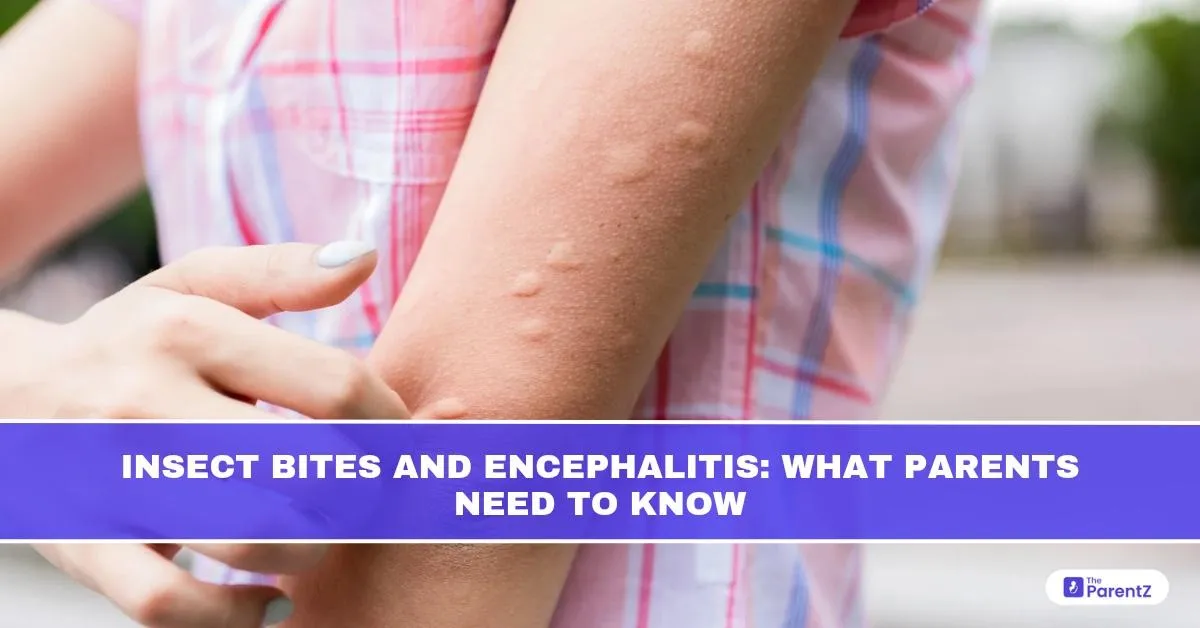Insect bites are common during childhood, especially in warmer, humid climates or after outdoor play. While most bites cause only mild skin irritation, some insects can transmit viruses that affect the brain, leading to a rare but serious condition called encephalitis.
As a parent, understanding which bites pose a risk and what symptoms to watch for can help you act quickly and prevent complications.
What Is Encephalitis?
Encephalitis is an inflammation of the brain, most commonly caused by viral infections. In children, it can be life-threatening and often requires hospitalisation.
Causes include:
- Viruses carried by mosquitoes (e.g. Japanese Encephalitis, West Nile Virus)
- Tick-borne viruses (e.g. Tick-borne Encephalitis)
- Post-infectious autoimmune reactions
- Herpes simplex virus, though not insect-borne, is also a leading cause
How Insect Bites Lead to Encephalitis
Not every insect bite is dangerous. The concern arises when infected mosquitoes or ticks transmit specific viruses into the bloodstream, which then travel to the central nervous system.
Common encephalitis-causing viruses transmitted by insects:
| Virus | Vector | Common Regions |
| Japanese Encephalitis Virus (JEV) | Culex mosquitoes | South and Southeast Asia (incl. India) |
| West Nile Virus | Mosquitoes | North America, parts of Europe |
| Tick-Borne Encephalitis Virus (TBEV) | Ixodes ticks | Europe, parts of Asia |
| La Crosse Virus | Mosquitoes | Midwestern & Eastern USA |
According to the Indian Academy of Pediatrics (IAP) and WHO, Japanese Encephalitis remains a significant public health concern in endemic Indian states like Uttar Pradesh, Bihar, and Assam.
Who Is Most at Risk?
Children under the age of 15 are more vulnerable due to their developing immune systems and frequent outdoor exposure. Risk factors include:
- Living in or visiting rural or endemic areas
- Playing outdoors near stagnant water or forests
- Not being vaccinated (in the case of Japanese Encephalitis)
- Weakened immunity due to malnutrition or illness
Early Symptoms Parents Should Not Ignore
Insect bites that cause encephalitis often appear harmless initially. However, within a few days, symptoms of brain inflammation can set in.
Initial symptoms (1–7 days after infection):
- Sudden high fever
- Headache
- Vomiting
- Lethargy or excessive drowsiness
- Irritability or inconsolable crying in infants
Progressing symptoms:
- Neck stiffness
- Confusion or behavioral changes
- Seizures or convulsions
- Weakness of limbs
- Difficulty speaking or walking
- Loss of consciousness in severe cases
These signs require immediate medical attention, especially if they follow a recent insect bite in an endemic area.
Diagnosis and Testing
Paediatricians usually admit suspected cases to the hospital. Diagnosis involves:
- Clinical history and neurological examination
- Blood tests and CSF (spinal fluid) analysis
- Brain imaging (CT or MRI) to detect swelling
- PCR tests to identify specific viral DNA
- In areas like India, JE IgM antibody tests are commonly used for diagnosis
Treatment and Recovery
There is no specific antiviral for most mosquito-borne encephalitis viruses. Treatment is mainly supportive, including:
- Hospital monitoring in paediatric ICU
- Fever control and seizure management
- IV fluids, nutrition, and oxygen support
- In some cases, corticosteroids or immune therapy
Herpes encephalitis, which is not insect-borne, responds well to antivirals like acyclovir and must be treated urgently.
Recovery varies:
- Some children recover fully within weeks
- Others may develop long-term neurological issues like epilepsy, learning difficulties, or motor deficits
Early intervention and rehabilitation therapies improve outcomes.
Prevention: How Parents Can Protect Their Children
Prevention is the most effective strategy against insect-borne encephalitis.
1. Use Mosquito Protection
- Apply child-safe insect repellent containing DEET or picaridin
- Install window screens and mosquito nets
- Dress children in long sleeves and full pants when outdoors
- Avoid outdoor play at dusk or dawn when mosquitoes are most active
2. Eliminate Breeding Sites
- Empty stagnant water from pots, coolers, tyres, and containers
- Encourage local fogging or larvicide use during monsoon season
- Keep water tanks covered
3. Vaccinate When Advised
- Japanese Encephalitis Vaccine is part of routine immunisation in many Indian states
- Two doses are usually given starting at 9 months to 1 year
- Check your child’s vaccination status during travel or high-risk exposure
4. Tick Precautions in Hilly/Forest Regions
- Wear closed shoes and socks
- Perform tick checks after outdoor visits
- Use permethrin-treated clothing if camping or hiking
Myth vs. Fact
| Myth | Fact |
| All insect bites can cause brain infection | Only a few viruses from specific insects cause encephalitis |
| Encephalitis always presents immediately | It may take several days after a bite for symptoms to appear |
| Vaccinated children cannot get encephalitis | Vaccine protects only against specific viruses, not all causes |
| It’s just a fever; it will pass | If fever is accompanied by confusion, drowsiness, or seizures, it is a medical emergency |
When to Seek Emergency Help
If your child has had a recent insect bite and develops:
- High fever with drowsiness or confusion
- Seizures
- Neck stiffness or severe headache
- Sudden behavioral changes
- Vomiting that does not stop
Rush to the nearest paediatric emergency department. Do not delay treatment.
Conclusion
While most insect bites in children are harmless, a small proportion can lead to serious infections like encephalitis, especially in endemic or rural areas. As a parent, early recognition and swift action are crucial.
Through preventive steps like insect protection, vaccination, and education, the risk of encephalitis can be significantly reduced. Always consult your child’s doctor if you’re concerned, especially after an unexplained fever or neurological symptoms following an insect bite.
References
- National Health Service (NHS) UK – Encephalitis in Children
- Centers for Disease Control and Prevention (CDC) – Arboviral Encephalitis
- Indian Academy of Pediatrics – National Immunization Schedule
- World Health Organization – Japanese Encephalitis Fact Sheet
- Pediatric Neurology Journal – “Acute Encephalitis Syndrome in Children: A Review”





Be the first one to comment on this story.